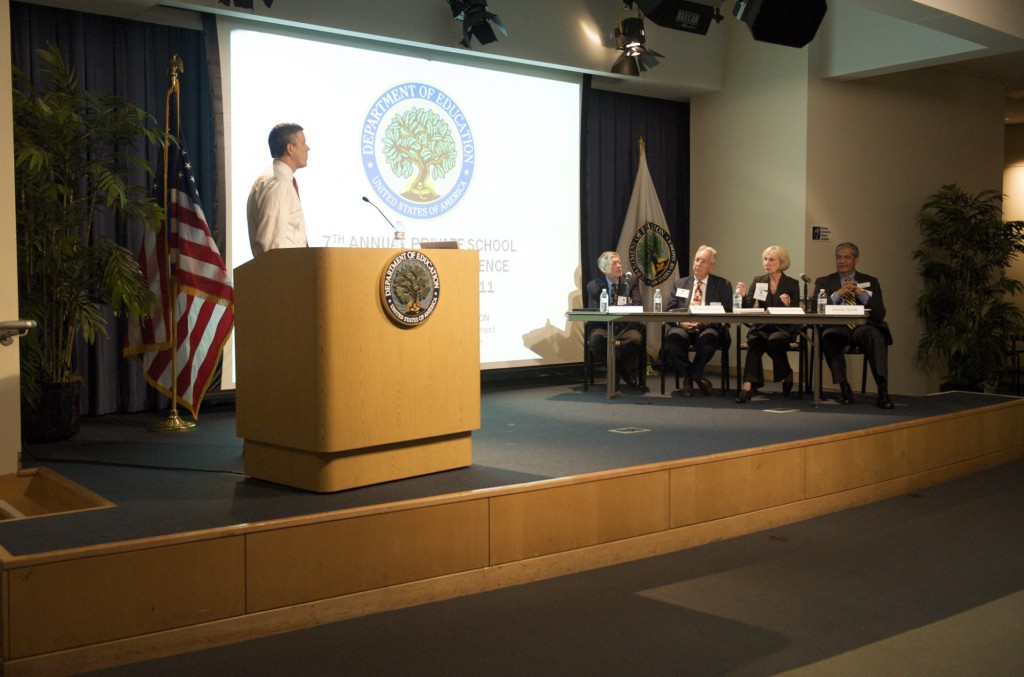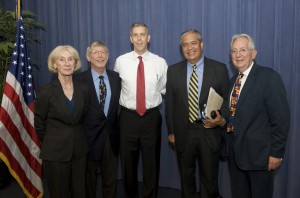 Building communities of collaboration on behalf of America’s most vulnerable children is the reason that Secretary Duncan praised public-private school partnerships at the recent Annual Private School Leadership Conference, hosted by ED’s Office of Innovation and Improvement’s Office of Non-Public Education (ONPE).
Building communities of collaboration on behalf of America’s most vulnerable children is the reason that Secretary Duncan praised public-private school partnerships at the recent Annual Private School Leadership Conference, hosted by ED’s Office of Innovation and Improvement’s Office of Non-Public Education (ONPE).
Duncan noted that independent private schools across America are partnering with public schools and other community organizations to address the academic and social needs of some of our nation’s most vulnerable children. One such example is the Private Schools with Public Purpose consortium, which encourages America’s independent and parochial schools to coordinate and leverage their resources, expertise, and experience with those of the public schools to benefit public school students and teachers.
During ONPE’s recent conference, a panel of PSPP leaders joined the Secretary and described partnerships across the country that aim to level the educational playing field for America’s young people. The panel highlighted the Middle Grades Partnership in Baltimore, where area private schools collaborate with public schools and other community organizations to create support programs for low-income middle school students and professional development for public and private school teachers.

(from left to right) Jacqueline Smethurst, Co-founder, Wingspan Partnerships; Al Adams, Former Headmaster, Lick-Wilmerding High School; Secretary Duncan; Jim Scott, President, Punahou School; and Roger Weaver, President and Senior Consultant, The Weaver Group and President, The Crossroads Community Outreach Foundation.
Another successful example of private-public school collaboration is Horizons National, which is a national network of partnerships between private and public schools that provides multiyear summer enrichment programs for low-income students. In other private-public school collaborations, private school associations, such as the Hawaii Association of Independent Schools, offer coaching, mentoring, and consulting services to public charter schools.
Public-private partnerships such as Private Schools with Public Purpose are a “collective brain trust,” Secretary Duncan told ONPE conference attendees, with such partnerships offering a “huge potential” to improve achievement for high-need students. He encouraged private schools to dedicate resources to assist underperforming schools in high-poverty areas to produce results and ensure all children receive a high-quality education.
To learn more about public and private school partnerships, visit:
- Crossroads School for Arts and Sciences
- Kamehameha School Community Education
- Lick-Wilmerding High School Civic Engagement
- Punahou School
- Wingspan Partnerships
- National Association of Independent Private Schools–The Public Purpose of Private Schools
Contact the ONPE, ED’s liaison office to the non-public school community, at ONPE@ed.gov for additional information.






EBMS does not deserve a Gold Star Award. Have you looked into their business practices? They give the schools a little money and they are hailed as local heroes. They are liars, cheats and thieves. When you buy insurance, aren’t you supposed to be insured? EBMS sells their “discount policies” to employers where they cancell your policy if you are sick and can’t still work 20 hours per week, even though you might pay all premiums on time. What they are selling is health assistance, not health insurance. They need to be forced to tell the truth. After 3 months of sickness from the shingles, my “health assistance, called insurance,” was cancelled even though I paid all premiums. How is that for misleading the public? You thing you are covered, but when you get sick, they drop you. I asked EBMS if I was hospitalized with a broken leg caused by some other driver running a red light, no fault of my own, and was in the hospital for 6 months, would they cancell my policy after 3 months? They said yes.
Is the concept of public/private partnering being applied to early childhood education, i.e. private daycare/preschool and public Headstart programs and if so, to what extent geographically and demographically?
Thanks for your question Tandy,
The U.S. Department of Education does not maintain specific information about the extent of the Private Schools with Public Purpose (PSPP) initiatives as it is not a program that is guided or funded by the Department. Nor is the Department aware of any overarching PSPP membership organization that might maintain such information. However, by viewing organizations’ websites listed at the end of the blog post, you may find some regional information available.
A significant number of PSPP partnerships exist at the elementary and secondary school levels. One example of a PSPP partnership that includes preschool children is the Germantown Academy, a long-established independent school in the Philadelphia region, and the Community Partnership School. The program prepares children to be strong applicants for admission to challenging public, independent, faith-based, and charter middle schools. The school has grown, from a Pre-Kindergarten through Grade 3, and now extends to Grade 5. This type of innovative and collaborative program that addresses the needs of underserved children serves as one of the various models that have grown organically over the past quarter century within the PSPP movement.
Cameron Brenchley
Office of Communications and Outreach